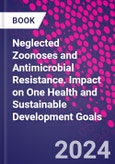Neglected Zoonoses and Antimicrobial Resistance: Impact on One Health and Sustainable Development Goals provides a thorough examination of how neglected zoonoses and antimicrobial resistance together hinder the achievement of sustainable development goals declared by the United Nations in the pursuit of a disease-free world. Neglected zoonotic diseases, as defined by the World Health Organization, are diseases likely to impact the livelihoods of livestock keepers and those living in periurban communities in developing countries. This book examines how such zoonoses affect the health of vulnerable farming populations and reduce the production capacity of their livestock.
Written by internationally recognized experts in the field of livestock and poultry zoonoses, this book provides the reader with a comprehensive description of modern sustainable development goals and defines neglected zoonotic diseases and their impacts on human physical, mental, social, and economic health. Subsequent chapters systematically describe the epidemiology, hosts and transmission, disease process, economic significance, and prevention and treatment protocols of key neglected zoonotic diseases, including echinococcosis, leishmaniasis, zoonotic tuberculosis, anthrax, brucellosis, leptospirosis, borreliosis, rickettsioses, and rabies. The book concludes with an assessment of the obstacles to achieving Sustainable Development Goals and possible mitigation strategies for veterinary researchers and policymakers alike.
Please Note: This is an On Demand product, delivery may take up to 11 working days after payment has been received.
Table of Contents
1. Sustainable Development Goal
2. Neglected Zoonotic Diseases
3. Neglected Cystic and Alveolar echinococcosis
4. Cysticercosis: Matter of Concern
5. Zoonotic Sleeping Sickness (Trypanosoma brucei)
6. Leishmaniasis
7. Zoonotic Tuberculosis
8. Anthrax
9. Brucellosis: A Neglected Zoonosis
10. Leptospirosis
11. Relapsing Fever Borreliosis
12. Rickettsioses
13. Rabies
14. Zoonotic Antimicrobial Resistance: Impact on human and animal health
15. Dual Obstacles to Sustainable Development Goals
16. Mitigation Strategy for Neglected Zoonotic Diseases and Antimicrobial Resistance
Authors
Indranil Samanta Associate Professor and Head of Veterinary Microbiology Department at the West Bengal University of Animal and Fishery Sciences, Kolkata, India.. Dr. Indranil Samanta is an Associate Professor and Head of Veterinary Microbiology Department at the West Bengal University of Animal and Fishery Sciences, Kolkata, India. Dr. Samanta's research focuses on Indian livestock, poultry, captive birds, and companion animals as sources of zoonotic pathogens possessing determinants of antimicrobial resistance, contaminated environment as a source of antimicrobial resistant bacteria and human behaviour related to antibiotic usage and prescription. . He has authored several research articles in peer reviewed journals and four books entitled Veterinary Bacteriology, Veterinary Mycology, Pet bird diseases and care, and Antimicrobial Resistance in Agriculture: Perspective, policy and mitigation Samiran Bandyopadhyay Principal Scientist at ICAR-Indian Veterinary Research Institute, Eastern Regional Station, Kolkata, West Bengal, India. Dr. Samiran Bandyopadhyay Samiran Bandyopadhyay is a Principal Scientist at ICAR-Indian Veterinary Research Institute. His research focuses on emergence of antimicrobial resistance in food and companion animals from eastern and north-eastern India. He is also the coordinator of animal science institutes working under Indian Network for Fisheries and Animal Antimicrobial Resistance Olivier Sparagano Professor at the City University of Hong Kong, Hong Kong.Dr. Olivier Sparagano is a Professor at the City University of Hong Kong. He received his MS from the University of Paris VII and his PhD from the Institute Pasteur and the University Lyon I. Prior to his current position, he was the Associate Pro-Vice-Chancellor for Research at Coventry University. He has been researching animal diseases, zoonotic pathogens, and vector-borne issues for more than two decades. His research focuses on poultry mites, ticks, mosquitoes, and other arthropod vectors and vector-borne-pathogens.








